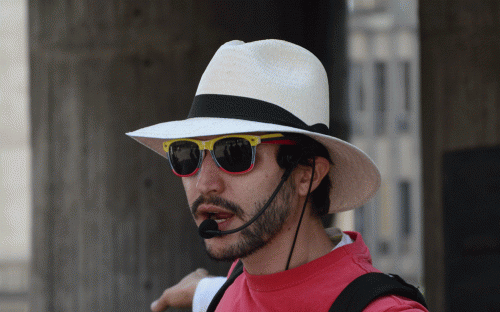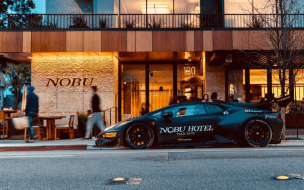He had left behind a seven-year engineering career, where he worked in various roles across Europe including in Hungary and his home-country, Colombia, and had pinned all his hopes on entrepreneurship.
So after two years studying at business school on the other side of the world, he returned to Colombia and had to stay with his family to save money. And he has much more to thank his family for; they helped him find enough capital to launch a start-up, a venture that was his first foray into entrepreneurship.
It has been a year since his return to South America and so much has changed since then. Real City Tours, the business he launched by himself in Medellín back in 2013, has risen as quickly as Pablo has changed career trajectory.
He has taken to business like a duck does to water and the company’s first anniversary was compounded by the news that he had made it to number-one on TripAdvisor’s Medellín list, seeing off competition from more than 30 other tourism businesses.
His start-up, founded on a passion for travelling and Colombian culture, sells tours around the historic town. Colombia is a tourism bastion and from 2011 to 2012 the industry grew 7 per cent, reaching 1.69 million tourists in 2012 and bringing them close to the United States, Canada and Mexico in the top-ten.
Pablo says he tells the “real” story of the region; the ancient history and beautiful, historic scenery, and the people, known as the Paisas, whom have stories to tell to foreign visitors.
“I’m saying this about TripAdvisor: we got to number-one because I’ve been methodological from the beginning,” says Pablo from Medellín.
“I started doing very simple things, like sending emails to my customers to close the circle of service. And that email enabled the tourists to review me. I would say: ‘Thanks. Would you mind answering these questions about the tour?’ People really appreciated it.”
A clever move. And the move of an entrepreneur, he agrees. “I’m very happy about it. More than 90 per cent of the reviews are excellent and the other 10 per cent are very good. We’ve even been able to launch a second tour two months ago, based on exotic fruits,” Pablo continues.
The business requires customers to pre-book online, something that is unheard of on free-walking-tours, he assures me. That model makes him unique and is, perhaps, why he has outshone all his competition.
Back in 2000, there were only 600,000 tourists visiting the country. Pablo has clearly capitalized on that surge, which has been fostered by a renewed cultural reputation, he says. Back when he was growing up, Colombia was plagued by stories of drug lords and other criminal activity.
“It was a challenge setting up the brand and creating a brand image and an identity,” Pablo says. When he began his initial tours, people confused his first-name for that of a renowned drug lord. “He was a super bad guy, one of the biggest drug lords ever, and I’m very happy you haven’t heard of him,” he continues, enthused by my ignorance.
“It was sad for me that travellers were talking about this man that was involved in the killing of people. People actually confused my tour with a similar tour about this drug lord.”
After the brand was established (and all memories of criminal networks banished) setting up the unique booking system was essential. “It doesn’t happen on other tours but we have limited spaces,” Pablo says. “We want to be organized and if our product is unique, customers realize its value.”
Finding guides who could also act as "story tellers" and who spoke English also proved difficult.
Pablo’s inspiration came from a passion for travelling. He spent four years abroad as an engineer and visited India, Palestine, Israel and Russia (among other places), and those experiences allowed him to see through the customers' eyes. “When I came back to Colombia I realized that tourism was booming, and that wasn’t the case when I left,” he explains.
“I knew as a traveller that you want to see the authentic side of any place, so I decided to create this company to help tourists to get close to the reality of my city.”
It was still a “dark situation” in Colombia and tourists were still afraid of visiting certain areas, he says. “Things have changed now, so I say Colombia has a bad reputation, but it’s not bad,” he says, quick to clarify. “That’s why I call it Real City Tours; the idea that the tourist can discover the reality.”
Business, much like the tourism industry, is booming. But Pablo would never have seen the opportunity if he still thought like an engineer. He considered beginning an MBA program, but an MSc in Innovation, Strategy and Entrepreneurship was a better fit. He knew he wanted to start a business, and although Grenoble prides itself on an entrepreneurial MBA program, it is more generalist.
Many MBA students begin their careers as engineers, but it gave Pablo a narrow-minded view. “The MSc is incredibly useful because my mind was narrowed to think about technical stuff, and think everything was about engineering,” Pablo explains.
“It was great because my business degree added a new ingredient to my way of thinking, and it allows me to see things as I never have before. Grenoble opened my mind and it also gave me confidence.”
That confidence is, seemingly, still growing. His dream is that Real City Tours becomes a house-hold brand across the whole of South America. “My dream is that this becomes an experience for tourists in any city they go to,” Pablo adds.
“And I think customers will buy into it because we organise these tours with a love and passion. I want it to become an experience in Colombia and even the whole of South America in a couple of years’ time.”
That would be a fitting end to this Colombian narrative.
RECAPTHA :
dc
09
66
ac








